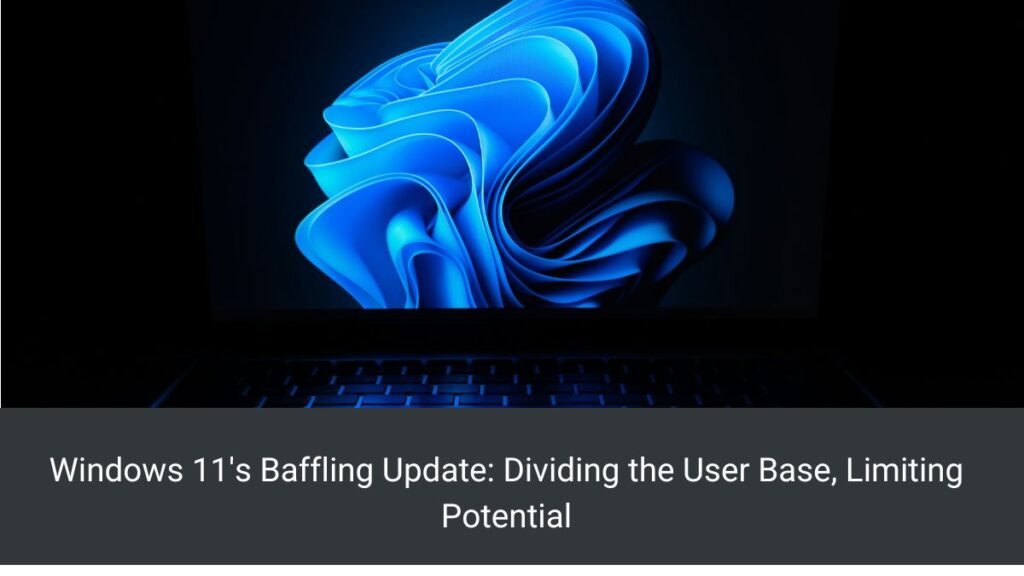A Fragmented Future for Windows
In a move that has left many users and industry observers perplexed, Microsoft has decided to split the future of Windows between two distinct user groups: those with AI-powered Copilot+ PCs and those without. The latest version of Windows 11, dubbed 24H2, will now be exclusively offered to users with Copilot+ hardware, effectively creating a divide within the Windows ecosystem.
The Rationale Behind the Decision
Microsoft’s decision to gate the Windows 11 24H2 update behind Copilot+ hardware appears to be a strategic move to promote the adoption of its AI-powered computing platform. By reserving the latest features and improvements for Copilot+ PCs, the tech giant aims to incentivize users to upgrade to the new hardware, potentially driving sales and accelerating the transition to a more AI-centric computing experience.
A Personal Perspective: Navigating the Fragmented Landscape
As an avid Windows user and technology enthusiast, I find myself grappling with mixed emotions regarding this development. On one hand, the prospect of AI-powered computing and the potential for enhanced productivity and efficiency is undoubtedly exciting. However, the decision to limit access to the latest Windows updates based on hardware capabilities raises concerns about fragmentation and potential compatibility issues within the Windows ecosystem.
The Potential Drawbacks of Fragmentation
Microsoft’s decision to split the development of Windows into three distinct groups – Windows 10, Windows 11 (legacy hardware), and Windows 11 (Copilot+ hardware) – carries significant risks and potential drawbacks. By fragmenting the user base, Microsoft may inadvertently create a divide within the Windows community, potentially hindering software compatibility, user experience, and overall ecosystem cohesion.
According to Statcounter’s data from May 2024, Windows 10 still holds a dominant market share of 64.7 percent in the United States, while Windows 11 accounts for only 32.3 percent of the user base. By limiting the availability of Windows 11 24H2 to Copilot+ hardware, Microsoft risks further slowing the adoption of its latest operating system, at least in the short term.
The Features and Capabilities of Windows 11 24H2
Despite the controversial decision to restrict access to the update, Windows 11 24H2 promises to deliver a range of exciting new features and improvements for Copilot+ PC users. These include Wi-Fi 7 support, HDR backgrounds, Sudo for Windows, and a revamped Copilot experience that migrates the AI assistant back to the taskbar, where it will behave like an app.
However, one highly anticipated feature, Recall, has been put on hold for testing through the usual Windows 11 Insider channels, potentially leaving Copilot+ users with a somewhat incomplete experience upon the initial release of 24H2.
The Road Ahead: Navigating the Fragmented Landscape
As the dust settles on Microsoft’s controversial decision, it becomes increasingly clear that the road ahead for Windows users will be fraught with challenges and uncertainties. The fragmentation of the Windows ecosystem raises questions about software compatibility, user experience, and the long-term viability of this approach.
While the allure of AI-powered computing and the potential for enhanced productivity is undeniable, the decision to limit access to the latest updates based on hardware capabilities risks alienating a significant portion of the Windows user base, potentially hindering adoption and slowing the overall progress of the platform.
As users and industry observers, it is crucial to remain vigilant and voice our concerns regarding this fragmentation. Microsoft, as a leader in the tech industry, must navigate this transition with care and consideration for the diverse needs and preferences of its user base.
In the end, the true measure of success for Windows 11 24H2 and the Copilot+ platform will lie in its ability to seamlessly integrate AI-powered capabilities while maintaining a cohesive and accessible experience for all users, regardless of their hardware configuration.

